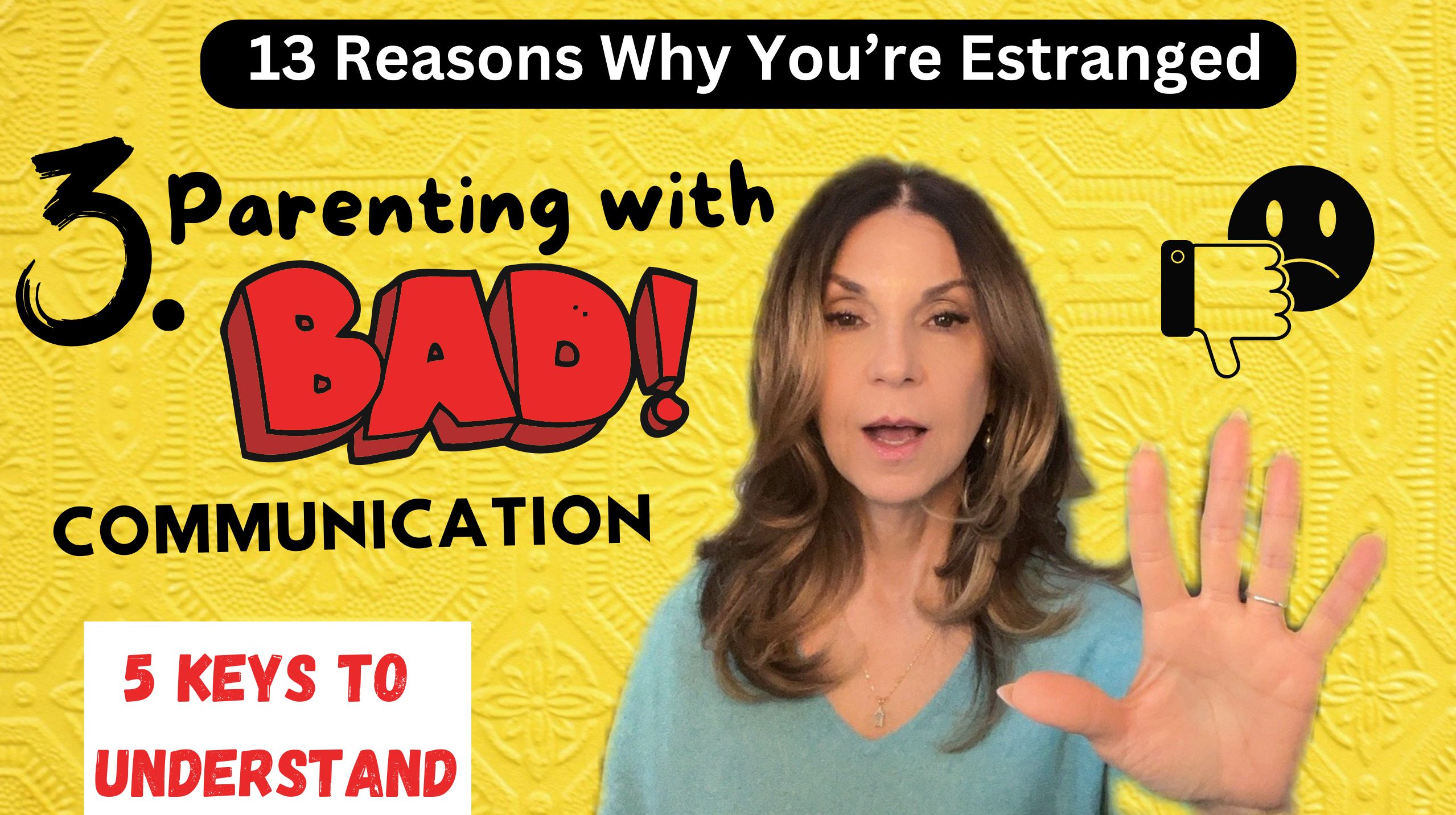Welcome back to the 13-part series through the complexities of family estrangement. As we delve into our third installment, I want to extend a warm welcome to those who are just joining us. We’re about to embark on a heartfelt exploration of a topic that touches many of us deeply: poor family communication and its heartbreaking role in driving loved ones apart.
Communication lies at the heart of every relationship, acting as the glue that binds families together. But not all communication is as nurturing and understanding as we’d hope. In fact, the misunderstood or mismanaged conversations often sow seeds of discord and ultimately lead to estrangement.
Picture this: a family struggling to express their emotions openly, sweeping issues under the rug to avoid confrontation, or failing to truly listen and validate each other’s feelings. In these moments of silence, avoidance, or outright conflict, the fabric of familial bonds begins to fray.
For those of you who may be new to our series, I encourage you to catch up on our discussions about divorce and parental alienation. These topics serve as important foundations for understanding the intricate dynamics of family relationships and the pain they can sometimes entail.
In the following sections, we’ll gently unpack the various aspects of poor communication within families. Through the lens of empathy and understanding, we’ll explore how these communication patterns can deepen feelings of hurt and rejection, often laying the groundwork for estrangement.
With each revelation and insight, we’ll uncover practical strategies for nurturing healthier family communication dynamics. Together, we’ll learn to navigate the tangled web of emotions and misunderstandings and foster spaces of love, acceptance, and reconciliation.
So, my friends, let’s journey onward with open hearts and compassionate minds. Together, we’ll discover the transformative power of empathy and understanding in healing the wounds of family estrangement.
The Impact of Communication Patterns
Navigating the intricacies of family communication is like traversing a vast and varied landscape. Emotions ebb and flow like tides, and words hold the power to build bridges or erect barriers. From lively debates and heated arguments to stifled silences and unspoken grievances, the spectrum of familial communication is as diverse as the individuals within it.
Yet amidst this complexity lies a sobering truth: ineffective communication patterns can sow seeds of discord within families, fostering an environment ripe for dysfunction. In these moments of miscommunication and misunderstanding, feelings of hurt and rejection can fester, casting shadows over once-bright relationships and paving the path toward estrangement.
But let us pause for a moment of reflection; acknowledging the gravity of these challenges opens us to the possibility of growth and healing. Research serves as a guiding light in this journey, illuminating communication’s critical role in exacerbating vulnerability to estrangement.
As we navigate this terrain with empathy and understanding, remember that each family is unique, with its own dynamics and challenges. In our quest for deeper connection and reconciliation, it is essential to approach these conversations with a blend of professionalism and compassion.
So, as we continue exploring the heart of family communication, let us do so with open minds and tender hearts. May our shared understanding pave the way for healing and renewal, bridging the divides that threaten to tear us apart and guiding us toward a future grounded in love and understanding.
Five Points to Consider
1. Parental Impact:
Parents wield a profound influence over communication dynamics within the family unit. Their words and actions are the blueprint upon which familial interactions are built. From the tone they set during disagreements to the way they express affection and understanding, parents lay the groundwork for how their children learn to navigate relationships.
However, it’s crucial to approach this topic with the utmost sensitivity and understanding, particularly when discussing cases of abuse. When safety and healing take precedence, addressing communication patterns may need to take a backseat to more immediate concerns. Ensuring the well-being of all family members must always be the top priority.
That said, the importance of effective communication skills cannot be overstated for families navigating more typical communication challenges. As Laura Davis poignantly illustrates in her book “I Thought We’d Never Speak Again,” the ability to communicate openly, honestly, and empathetically is often the linchpin in preventing estrangement. Parents can play a pivotal role in maintaining healthy familial bonds by fostering an environment where emotions are validated, grievances are addressed, and misunderstandings are resolved.
In essence, parental influence extends far beyond the household’s confines, shaping how children perceive and engage with the world around them. By cultivating strong communication skills within the family unit, parents lay the foundation for meaningful connections and equip their children with invaluable tools for navigating relationships throughout their lives.
2. Invalidation:
Invalidating communication, characterized by a lack of acknowledgment or understanding of one’s emotions or experiences, creates a profound sense of disconnection within families. When individuals feel unheard or unseen by those closest to them, they foster an environment devoid of the support and nourishment essential for healthy relationships to thrive.
Imagine a child expressing their feelings or concerns only to be met with dismissiveness or indifference from their parents. In such instances, rather than feeling validated and understood, the child may internalize a sense of worthlessness or inadequacy. Over time, repeated experiences of invalidation can erode trust and intimacy within the family unit, leading to isolation and loneliness for all involved.
Children raised in environments where their emotions are routinely invalidated often grow up feeling disconnected from their families. They may struggle to form meaningful connections with others, fearing their thoughts and feelings will again be disregarded. This sense of emotional isolation can have far-reaching consequences, impacting their relationships and overall mental and emotional well-being.
It’s essential to recognize that invalidation can take many forms, from outright dismissal of one’s experiences to more subtle forms of gaslighting or minimization. Regardless of the method, the underlying message remains the same: your feelings are invalid, and neither are you.
As we reflect on the impact of invalidation within families, let us strive to create environments where every voice is heard, and every emotion is valued. By fostering a culture of empathy and understanding, we can ensure that our loved ones feel seen, heard, and supported, laying the foundation for healthy, fulfilling relationships that withstand the test of time.
4. Grudges and Unresolved Issues:
In families where hurts and offenses linger unaddressed, resentment can become a heavy burden, straining even the strongest bonds. When grievances go unresolved, and conflicts remain unaddressed, they fester beneath the surface, poisoning the very fabric of familial relationships.
Imagine a family where disagreements are swept under the rug, grievances left to simmer beneath a thin veneer of normalcy. Despite outward appearances, tensions brew beneath the surface, waiting to erupt at the slightest provocation. In such environments, the absence of healthy conflict resolution skills only exacerbates the divide, driving a wedge between family members and further contributing to the cycle of estrangement.
The longer these grudges are allowed to fester, the more bottomless the chasm that forms between family members. Resentment breeds contempt, and over time, what once may have been minor disagreements can grow into insurmountable barriers to reconciliation. Left unchecked, these unresolved issues can become the foundation upon which estrangement is built as family members drift further apart, unable to bridge the gap that divides them.
It’s essential to recognize that addressing and resolving conflicts within the family is not a sign of weakness but rather a testament to the strength of familial bonds. By fostering open and honest communication, families can create a safe space for addressing grievances and finding mutually agreeable solutions. Through forgiveness and reconciliation, even the deepest wounds can be healed, restoring trust and familial connections.
As we confront the challenge of grudges and unresolved issues within families, let us do so with courage and compassion. By facing these conflicts head-on and committing to the hard work of reconciliation, we can pave the way for healing and restoration within our families, ensuring that estrangement does not have the final say in our relationships.
5. Disparate Values:
Differences in beliefs, morals, and lifestyle choices can lead to tension and disagreement within families. Feeling judged and experiencing shame can alienate family members, especially when values clash persistently without resolution. In my next blog post and video, I dive deeper into the subject of family members having different values and how that can lead to estrangement.
In conclusion, our exploration of poor communication patterns within families has shed light on these dynamics’ profound impact on relationships and the heartbreaking consequences they can lead to, such as estrangement. From the influential role of parental communication to the detrimental effects of invalidation, grudges, and unresolved issues, we’ve witnessed how these factors can erode the foundation of familial bonds, driving loved ones apart.
However, amidst these challenges, there is hope. We can mend broken relationships and rebuild trust by fostering open, honest, and empathetic communication within our families. It’s essential to confront conflicts head-on, address grievances, and strive for resolution, even when the process may be difficult or uncomfortable.
As we continue our journey of understanding and reconciliation, I invite you to share your thoughts, questions, and experiences in the comments below. Your insights and perspectives are invaluable as we navigate this complex terrain together.
Remember to subscribe to our YouTube channel for more insightful discussions and practical tips on navigating family relationships and overcoming estrangement. Together, let’s embark on a journey of healing and renewal, fostering spaces of love, acceptance, and reconciliation within our families.
Stay tuned for our next blog post and video, in which we’ll delve deeper into disparate family values and how they can contribute to estrangement. Until then, may you find strength and solace in compassionate communication.









